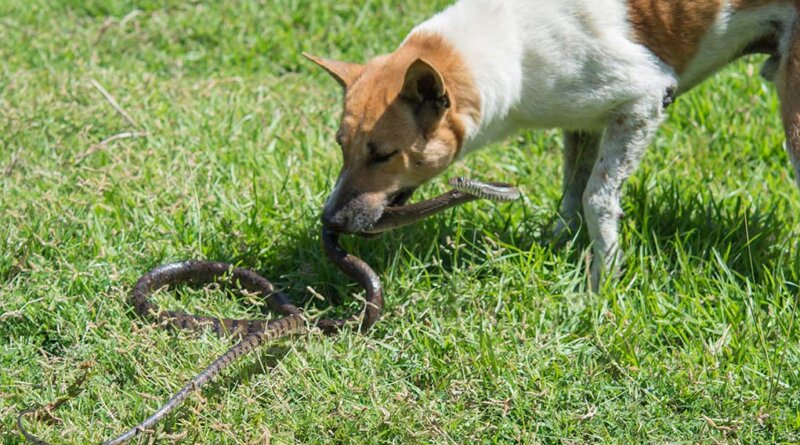Symptoms, Treatments, Prevention, & More – Top Dog Tips
There are more than 3,000 species of snakes on the planet, and 600 are venomous, and 30 of those venomous snakes have been discovered in the United States.
In this article, we’ll discuss everything about snake bites in dogs.
Most of us humans have a huge fear of reptiles—specifically, snakes. But have you ever seen those YouTube videos where a dog encounters a snake?
Well, let’s just say that they’re not frightened about these serpents.
A dog’s curiosity can sometimes lead to a snake bite when things are not handled properly.
On the off chance that your dog gets bitten by a snake, you’ll need to know what to do for emergency care.
Below, we’ll discuss the symptoms, diagnosis, treatment, and prevention of snake bites in dogs.
What is Snake Bite in Dogs?
Snakes can be found all over the U.S. and their venom is not to be taken lightly. Even though not all snakes have deadly venom, their bites can still cause discomfort and irritation for your dogs.
Unfortunately, when it comes to venomous snakes, you’ll have to act quickly to be able to save your pup.
If you’re not experienced in these kinds of situations, it would be best to not do any life-saving measures on your own.
Instead, rush them to the nearest veterinary clinic as soon as possible.
Factors to Determine the Severity of the Snake Bite
There are a lot of factors to determine how you’ll be able to treat snake bites in dogs.
Reaction to a snake bite will depend on the species of the snake and the volume of venom injected.
Types of Snakes
Not all snakes have venom, however, some snakes even though not poisonous, have a more painful bite that can cause infection.
Moreover, some snakes have more toxic venom than others. Others have slow-acting venoms that can cause negative effects later on.
Common Types of Non-venomous Snakes in North America
- Garter Snakes
- Kingsnakes
- Milk Snakes
- Racers
- Water Snakes
Common Types of Venomous Snakes in North America
- Rattlesnakes
- Cottonmouths
- Copperheads
- Coral Snakes
Amount of Venom Injected
Since snakes are hunters, their venom glands are fuller during the warmer seasons, resulting in a more dangerous bite.
However, the amount of venom can also vary on the size and maturity of the snake.
Area of the Snake Bite
On the other hand, keep in mind that if the area of the bitten area is close to the heart, it’ll spread more quickly throughout the dog’s body.
Why do snakes bite?
Snakes bite when gathering food. Other than that, there is no other reason for them to bite other creatures.
That’s why when they are aggressive, it’s because they are defensive.
Dogs are curious animals. And when a dog is too hard-headed to leave these reptiles alone, they can get bitten.
Symptoms of Snake Bite in Dogs
Early signs of snake bite may appear within the first hour to 24 hours after the bite happens.
But keep in mind that the effects of the snake bite on your pet’s body will begin instantly.
So how will you know if your dog has been bitten by a snake?
Below, we’ve compiled a short list of the clinical signs and symptoms of snake bites in dogs:
Non-venomous Snake
- Pain
- Swelling around the area of the bite
- Visible puncture wounds
- Bleeding from the bitten area
- Possible infection can occur after time
Venomous Snake
- Tremors
- Pale Gums
- Mental Dullness
- Collapsing
- Excessive Drooling
- Vomiting
- Blood in urine
- Slow breathing
- Muscle Contractions
- Paralysis
- Dilated pupil
- Incontinence
- Unsteadiness/weakness in hind legs
- Irregular bleeding from the nose, mouth, or anus
- Loss of bladder and bowel control
Treatment for Snake Bites in Dogs
Treatment for snake bites requires professional attention. It’s best to seek a veterinarian immediately after the incident.
If a veterinarian’s contact information is available, it’s best to make a call promptly after the incident.
This will help the clinic/ hospital prepare the necessary equipment and tools to treat the wound upon arrival.
The veterinarian may ask questions regarding the area of injury, the time of the incident, and if the snake is venomous or nonvenomous.
One should not take time if they do not know whether the snake is venomous or not.
It’s important to rush the dog to the clinic to address the wounds and administer the necessary medications urgently.
Remember to avoid being agitated as the dog can sense emotions around them and tends to be influenced easily.
Snake Bite Emergency care
Moreover, here are a few tips for first aid or emergency care to minimize the effects of the venom.
But remember to don’t waste your time doing this, instead, drive to the animal hospital immediately.
On your way to the hospital, if possible, another person should assist in the delivery. it’s best to keep the wounded area lower than the heart.
This can slow down the circulation of blood and venom if the snake was venomous.
- Rinse the affected area with water to remove some venom
- Keep the dog immobile as much as possible to reduce the spread of venom
- If your dog is not breathing, administer CPR (call the vet for instructions if you don’t know how)
- Always keep calm as your dogs know when you are stressed. An increase in stress levels can cause the venom to spread in the body faster.
Over-All Examination
Upon arrival, the veterinarian will thoroughly examine the dog’s injury and condition. Along with it, follow-up questions for the owner will come after.
Tests will be administrated and the veterinarian will evaluate the results.
This will include the bite site of the snake. Since snake bites are prone to tissue damage, veterinarians will mark the area and monitor its condition as well.
Oral / Injected Administration
After the examination and evaluation of results. IV can be administered along with medications that will help suppress the spread of infection, tissue damage, hypotension, and shock.
Tetanus Antitoxin may also be included in the treatment.
Anti-Venom
This applies to dogs bitten by venomous snakes. Treatment for envenomation is critically time-dependent and region-dependent.
If the anti-venom is administered on time, recovery is positive. Administering it before circulates over the body is essential as well.
Treating and Cleaning Injury
After the general examinations and oral/ injected regulations. Veterinarians may begin treating the affected area.
To reduce infection and further injury, they will also clean the affected and surrounding areas.
Observation
After the treatment, the veterinarian will hold the dog for observation for at least 24-48 hours in the clinic/ hospital.
If the dog’s prognosis is positive, they will be able to head home after and will be prescribed house rest for 2 weeks.
While with a poor prognosis, dogs will have to stay in the hospital until instructed further.
Hospitalization is recommendable for recovery due to the accessible medication, equipment, and professionals.
Recovery of Snake Bite in Dogs
The prognosis of recovery from snake bite in dogs will vary on different factors.
For instance, it will depend on the dog’s age, size, current health status, the time that passed before any treatment happen, bite location, and the size of the wound.
One factor that can contribute to a poor prognosis is when you bring the dog to the vet when his condition is already grave.
In these cases, it will not matter how good the vet is or how fast they can provide the treatment.
Moreover, the inability to determine the type of snake that bit your pet can also cause problems.
The type of snake is required to know what the proper treatment is needed for your pup.
The good news is that a successful recovery is possible. However, follow-up checkups are required to further assess the healing of the wound and the return of bodily systems, muscles, and organs to their normal operation.
Treatment for snake bites in dogs will not be cheap. Fortunately, a lot of pet insurance covers a big percentage of the bill back to you.
Prevention of Dog Snake Bites
If you live in a state where there are plenty of known species of poisonous snakes, it is in your best interest to research precautionary measures to keep your pup from getting bitten by a snake.
When it comes to snake bite prevention, you can train your pup to avoid snakes using positive reinforcement.
Here are a few tips to avoid snake bites in dogs:
- When hiking, stay on designated trails and be alert on the ground you and your dog are walking in.
- Train your dog to have a solid “leave it” cue or other diversion signals to turn their attention away from potential danger.
- Don’t let your dog dig in unknown places
- Don’t let your dog stick their head underneath rocks, trees, and other places snakes can hide.
- Pay attention to your dog when you notice that they are trying to sniff at something.
- Avoid cooler areas when the weather is hot as snakes are cold-blooded creatures that regulate their body temperature with the environment.
- Examine safe snake repellent for your yard.
- Try stomping the ground to scare them away. Large amounts of vibration tend to scare snakes away. However, remember to keep your distance to avoid getting bitten.
Snake Bites in Dogs: Frequently Asked Questions
Can a dog survive a snake bite without treatment?
The survival rate for pets that are left untreated from a snake bite is lower than the rate of pets that are treated quickly.
For instance, about 80% of pets that were given immediate care survived the snake attack.
Usually, it’ll take 24 to 48 hours for a pet to recover when they are given the treatment promptly.
However, some pets will take longer to recover because of tissue damage to internal organs and will require intensive care.
How fast can a dog die from a snake bite?
Snake bites require immediate care for everyone. A dog can die within 25 minutes of lethal envenomation.
Unfortunately, there are some cases where the pet dies on the car ride to the vet.
It would be best to call the clinic ahead so that they can prepare the proper treatment once you’ve arrived.
How much do snake bites hurt dogs?
Usually, dogs can feel intense and immediate pain in the area of the bite. Swelling also typically progresses for up to 36 hours.
A snake bite can also cause the dog to collapse, vomit, go into shock, or have shallow breathing.
Snake Bites in Dogs Summary
In conclusion, when it comes to snake bites in dogs, remember that time is of the essence.
Contact your vet immediately and rush your pet to the clinic as fast as you can. The faster they’ll get treatment, the higher the chances of them surviving the attack.
When it comes to snake bites, you’ll have to determine what kind of snake bit your dog.
Is it a non-venomous snake or a venomous snake? Your vet will need to know this info to know what the proper treatment your dog needs is.
If you live in an area where it is known to have high inhabitants of snakes, it is your job to research and be prepared if ever this unfortunate event happens.
You know what they always say, it’s better to be safe than sorry.
RELATED: WHAT TO DO IF YOUR DOG BITES ANOTHER DOG
Related









